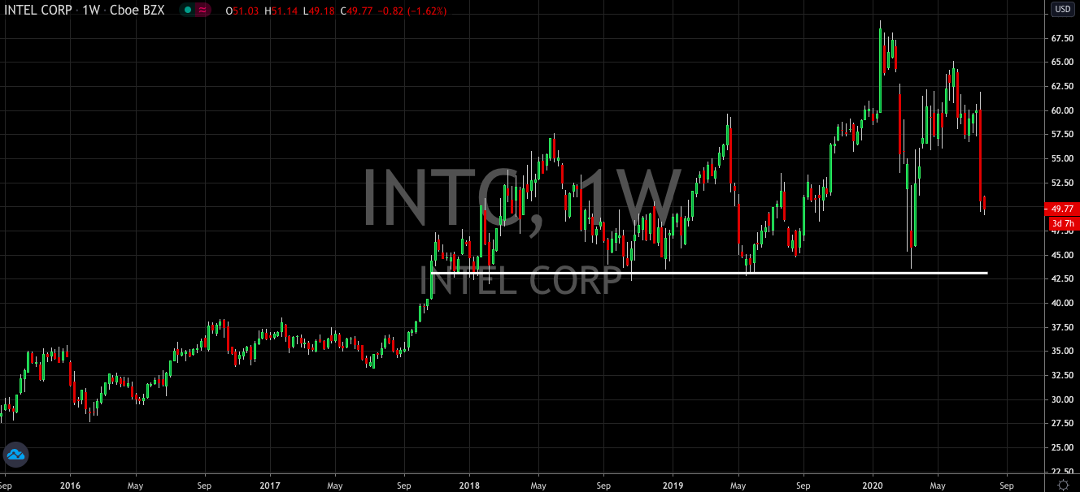It’s been a tough year so far for shares of technology giant Intel (
NASDAQ: INTC). They had just broken above the $60 mark for the first time and were powering into all-time highs when COVID-19 wrecked equities in Q1.
They had only broken above the $40 a share level in 2017 for the first time since the dot com bubble, and unfortunately for investors, look set to continue being fairly range-bound between there and $60 a share.
Given the intervening years saw the continued rise of the FAANG group of stocks and consistent all-time highs for the major indices, investors couldn’t be blamed for growing impatient with the one-time tech leader. It must have felt that its five-decade history was slowing it down compared to the five-year-old companies surpassing it.
Competitive Struggles
With the emergence and rise of chipmakers like Advanced Micro Devices (NASDAQ: AMD) in recent years, Intel has struggled to handle the increased competition. While its annual revenue numbers have been trending in the right direction, they’ve lacked the consistent double-digit percentage jumps that the younger, more nimble companies are posting.
That being said, last week’s Q2 earnings report did show a 19% jump in revenues year on year but that was quickly forgotten, if not ignored, as management announced a defect driven delay in the development and release of their 7-nanometer processors.
These were meant to be the company’s answer to the next generation of chips which are starting to hit the market and would have been the brightest light of hope that investors were clinging to. The fact that they’re now trending 12 months behind the initial target, and won’t be available until late 2022 at the earliest, does not bode well for the company’s ability to regain its much needed competitive edge.
Multiple Downgrades
Wall Street has been ruthless in the days following the news. Deutsche Bank, Bank of America, Barclays and Bernstein are just some of the larger firms that have slashed their ratings on the stock. Bernstein in particular were taking no prisoners when they said “ordinarily we frown on moving ratings directly on an earnings night. But this, our 45th Intel earnings call, was the worst we have seen in our career covering the company and brings the structural issues we have been talking about for years directly to the forefront."
Unsurprisingly, the stock took a nosedive, with last week’s 15% drop easily outdoing the worst of the weeks from Q1’s market crash. Maybe it was fate, but shares look destined to trickle back towards that $40 level again. For many, this latest news completely validates Apple’s (NASDAQ: AAPL) decision to part ways with Intel last month as they head towards self-sufficiency with their own proprietary chips.
Playing The Long Game
Management will focus on the positives and talk about the big jump in revenue and strong demand for Intel’s cloud services, but Wall Street likes to look into the future and has little patience for companies who can’t paint a positive picture of the road ahead. Intel may still be a $200 billion tech company, but it’s a $200 billion tech company that’s trading not only at 2017 but 1999 prices.
It will take a few weeks for the dust to settle and for future revenue targets to be readjusted. Even with the stock’s RSI below 30, indicating oversold conditions, the long term play hasn’t materialized yet. For investors with itchy fingers, it’s worth sitting on your hands for the moment and letting the reverberations of last week’s report run their course.
There’s still a pipeline of next-generation technology coming, be it the 7nm processors or the 5G modems, but for now, management has a lot of work to do to convince Wall Street that they’re worth the long game.

Before you consider Intel, you'll want to hear this.
MarketBeat keeps track of Wall Street's top-rated and best performing research analysts and the stocks they recommend to their clients on a daily basis. MarketBeat has identified the five stocks that top analysts are quietly whispering to their clients to buy now before the broader market catches on... and Intel wasn't on the list.
While Intel currently has a Reduce rating among analysts, top-rated analysts believe these five stocks are better buys.
View The Five Stocks Here
MarketBeat just released its list of 10 cheap stocks that have been overlooked by the market and may be seriously undervalued. Enter your email address and below to see which companies made the list.
Get This Free Report
Like this article? Share it with a colleague.
Link copied to clipboard.